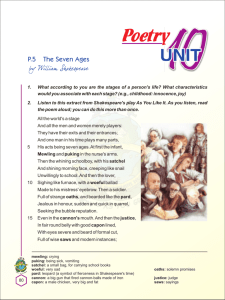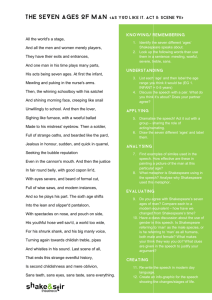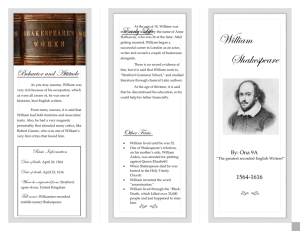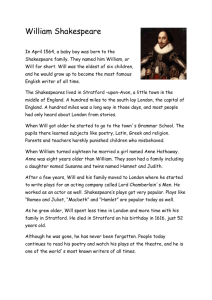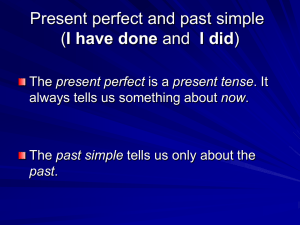The Seven Ages
advertisement
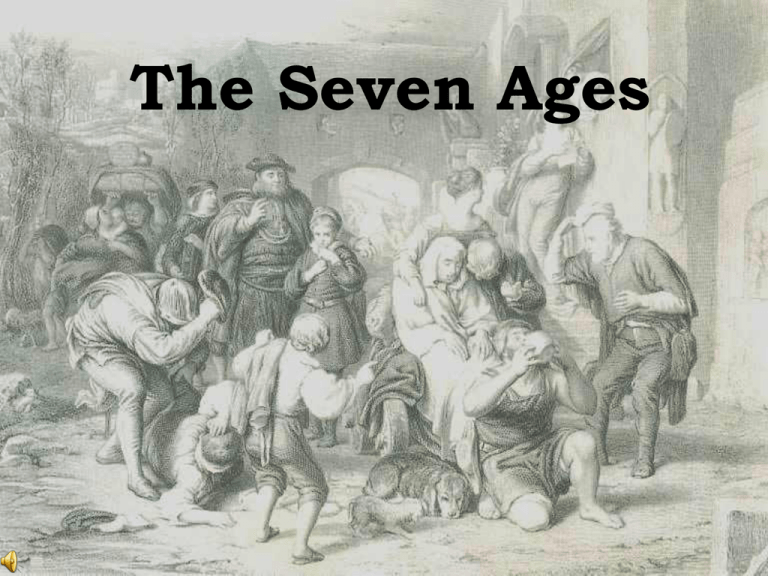
The Seven Ages Acknowledgment This presentation is an outcome of ideas, comments and suggestion given by teachers. We heartily thanks our Principal- B. B. Mishra for the valuable advices. Further, we give our special thanks to ~ Our class teacher Mr. Sahir Sheikh sir for their supporting and encouraging advices. We express our glad gratitude to all my friends and family members who have given precious time and support in fulfillment of this project. Theme of the poem The poem “The Seven Ages”, which is actually an extract from Shakespeare’s delightful comedy “As You Like It”. This master piece of poetry is a moral commentary on life written in an exceptionally exclusive style which is the attribute of Shakespeare. The poem contains an amusing and classical description on human nature and behaviour which reflects Shakespeare’s deep awareness of human psychology. The poet makes a comparison between world & stage. He says that world is like a stage, life is like acting & men and women are like actors. He classifies man’s life into seven different ages. About William Shakespeare William Shakespeare (1564-1616) was born in Stratford - Upon- Avon . He is considered by many to be the greatest dramatist of all the time. He wrote 154 sonnets, two long narrative poems and about three dozen plays. Shakespeare used poetic and dramatic means to create unified aesthetic effects. In verse he perfected the dramatic blank verse. Poetry All the world’s a stage And all the men women merely players: They have their exits and their entrances; The poet makes a comparison between world & stage. This world is just like a stage of a theatre. All persons being players are given different roles and both men and women are having same entrance and exits. And one man in his time plays many parts, His acts being seven ages. At first the infant, Mewling and puking in the nurse’s arms. According to Shakespeare, every man plays several parts during his life time. On the stage of life every man has seven acts. The first act of man is infancy. At this time all that the baby does is cry and puke on his nurse's lap. After he goes through his infant life, he emerges as a school child. Then the whining schoolboy, with his satchel And shining morning face, creeping like snail Unwillingly to school. And then the lover, Shakespeare describes him as a boy having a face fresh like morning, with his bag hanging on his side, walking appropriately to school. In the beginning he does not like going to school but gradually his thinking changes. When time passes onwards the schoolboy transformed into a youngster. Sighing like furnace, with a woeful ballad Made to his mistress’ eyebrow. Then a soldier The young man is a lover who is busy composing ballads for his beloved and sighing deeply for her attention. Gradually, he graduates into a bearded soldier. Full of strange oaths, and bearded like the pard, Jealous on honour, sudden and quick in quarrel, Seeking the bubble reputation. Even in the cannon’s mouth. And then the justice, The soldier promises solemnly to guard his country. He is filled with national pride, is quick to be insulted and is always ready to spring up in defence. At this point of time he is more concerned with status and reputation. From the agile soldier, he goes on to become a judge. In fair round belly with good capon lined, With eyes severe and beard of formal cut, Full of wise saws and modern instances; And so he plays his part. The sixth age shifts The fifth stage of man’s life which he calls middle age or “judge”. In fair round belly with good tasty food. His body develops as he gets matured. Practically, his is a blend of custom, morality, religion, and education. The visible authority can be well located in him. Here he acts like the ruler, or chief; the ultimate authorities to pass a judgment on any aspects of life. After he has played this part, he goes into the sixth age. Into the lean and slippered pantaloon, With spectacles on nose and pouch on side, Into the sixth age he becomes thin, wears spectacles, the skin around him hangs loosely. The man grows older and becomes weak. His youthful hose, well saved, a world too wide For his shrunk shank: and his big manly voice, Turning again toward childish treble, pipes And whistles in his sound. Last scene of all, His clothes hang loosely around him and his once manly voice turns into a high pitched, childish one. With this, man enters the last act. That ends this strange eventful history, In second childishness and mere oblivion, sans teeth, sans eyes, sans taste, sans everything. This age of man’s life is more or less same as that of the second phase of man’s life because at this stage man again behaves like a child. He is overcome by senility and forgetfulness, as he loses his faculties of sight, hearing, smell and taste, slowly but surely, and ultimately dies. Guided by: Mr. Sahir Sheikh Presented by – Sabiya, Mitanshi, Ritika, Aparna, Ayushi, Shivani, Priyanshi, Anjali, Pragya, Garima and Riya.

